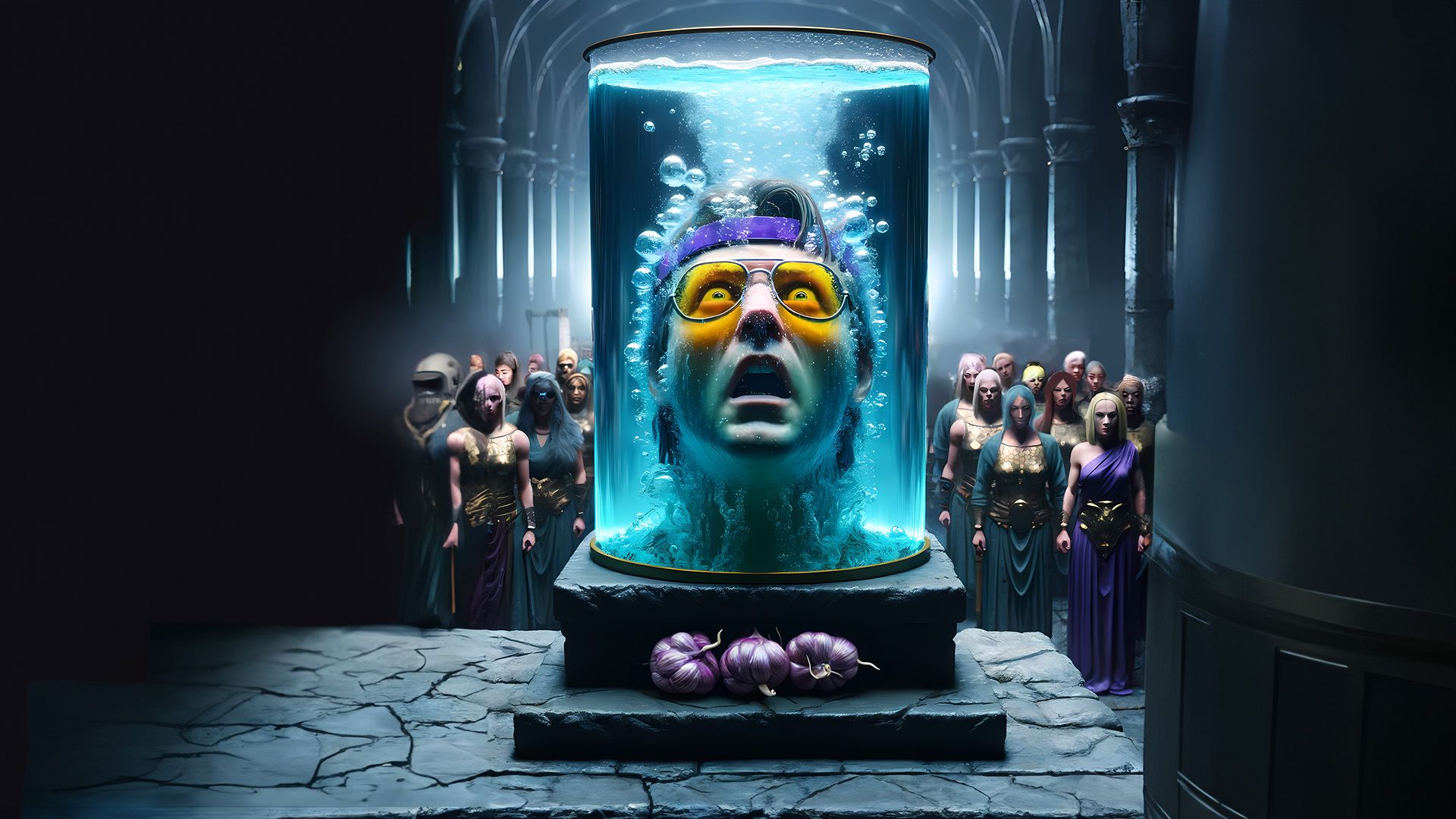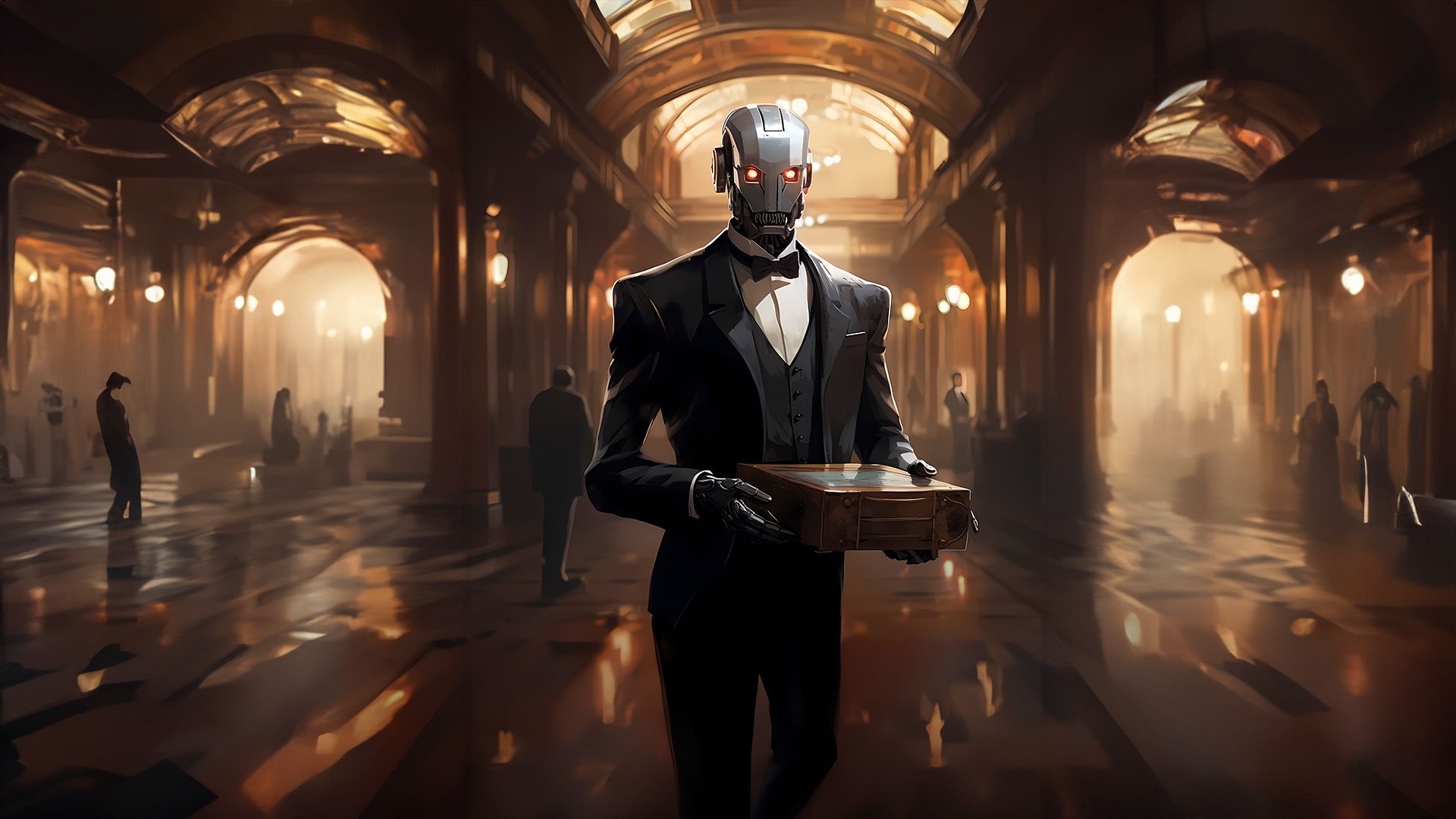·Jon Chan · fiction · 13 min read
Home Base
I'm sure you've all heard the stories about the Phoenix. About the notorious figures that have cut its rugs. Or the Republic of Freebooters getting started at one of its tables. Everyone’s heard of our battle with the Tax Revenue Fleet. But people rarely think about its humble beginnings. This is that story.

The market will provide.
I told myself that for the eighth time today. It helped me keep focus as I scrubbed the floors of my new place of business. After that, I needed to check the atmosphere scrubbers, purge the waterlines, test the power converters, place all the burnt iso chips, and then make breakfast. After that, my cash reserves would be close to zero.
The market will provide.
A feminine voice crackled through unseen speakers.
“Attention, citizen Gunnar Hayek, you have been working for 14 hours without leisure or rest, this is a violation of Union code 446-118.”
“Thank you, Agnes.”
I could have turned the AI off when I bought this space station, but Agnes had grown on me. Even though I ignored her at every turn, she did remind me to sleep. Plus, Agnes played a key part in my new business venture.
Two years ago, this was Union of Creed Outpost PH-1X2—which I renamed Station Phoenix because I’m sentimental. Post-war, the Alliance seized its weapons and decommissioned its shields but left its AI and power generators intact. When it went up for auction, I snapped it up for a song. No one else wanted a station in the middle of nowhere, but I saw the potential for a bitcoin mining operation.
All the surrounding systems joined the Alliance during the war. They had such a jolly-good time bombarding Union worlds together that they all decided to create a single currency. I didn’t love the idea. And when selling assets and raising taxes didn’t solve their war-debt problem, the bureaucrats cranked their money-printing machines into overdrive. That’s when I knew I needed to make a move, physical and otherwise.
That’s what led me here to the Phoenix. By the end of the night, I wired 90% of Agnes’ circuits to chase after those block rewards. And when I had that decentralized currency in hand, I’d start buying up commodities.
It was a buyer’s market out there. The people would come to me.
The market will provide.
The market did not provide. I lay in my bunk staring at the ceiling two weeks later. Agnes had done her job, adding a block to the chain and putting 6.25 bitcoins into my wallet. But no one came. I started to wonder if this empty station would become my tomb. It was certainly quiet enough to be.
I almost fell out of bed when my workstation chimed. The notification on the screen told me it was a ‘gram from Hanna Danes.
Hey, Gun.
What’s up?
I need a place to lay low for a bit. You still own that station?
It’s called the Phoenix. And yes. And you’re more than welcome to chill. Please save me from my boredom.
The hiss of the airlock hid my suppressed gasp. I hadn’t seen Hanna face-to-face in quite a while. She joined up with the Alliance navy when the war started as a fighter pilot. Word got out in our friend circle that she got shot down over Grecia, but I never expected this. The neural ports in her neck were scorched and the burns ran down the length of her arm like a living fire had traveled down her nerves and tried to escape through her fingertips.
She gave me a wry smile. “What? This is the part where you say I look good.”
“You look good,” I said, stepping forward to give her a hug.
I gave her the three-credit tour, which probably wasn’t far off its actual value as there wasn’t much to see. The station consisted of three rings. The Alliance cleaned out all the point defense cannons so the outer ring really only had airlocks, storage areas, and a few workshops. The middle was mostly living quarters for the 350 crew members and amenities like the mess, gym, and green space. Lucky for me, the Alliance left all that intact. The command deck occupied the center ring. That’s where Anges’ hardware lived.
“I knew the Union only had three approved colors, but this place is drab,” said Hanna, craning her neck to peer at the gray ceiling.
“Clean, though.”
“And you haven’t had any visitors?”
We stopped in front of a projection window. Transparent windows proved poor armor so instead, the Phoenix’s engineers put in projection windows that displayed an“enhanced” view of the stars beyond the hull.
“None,” I said.
“You really think this scheme of yours is going to work?”
“Tell me, how are things out there? Like how are they really out there?”
Hanna shrugged. “People are trying to keep calm and carry on, but underneath there’s FUD.”
Fear. Uncertainty. Doubt.
“The Alliance may have won, but the war destroyed both sides. I want this place to be a respite from the hyperinflation that’s right around the corner,” I said.
Hanna jerked her head towards the stars in the window. “The fuel costs to get here alone would eat up any profits.”
I rubbed my chin. The Phoenix’s success banked on the Alliance’s fiat currency going haywire. Then this place would be an oasis in the desert. That thought tickled something in my brain.
“You hungry?” I asked.
“I could eat. What are you serving?”
“All I have are ration packs left.”
Hanna nodded. “Don’t worry, I spent a lot of time on the front saucing those MREs up.”
She wasn’t lying. Normally, the curry potatoes were mushy, but Hanna dumped the whole kit into a pan and tossed it in the mess’ oven. Then, from three different packets, she pulled bland crackers, chocolate pudding, and cream cheese. The crumbled crackers became a base for a whipped concoction of pudding and cream cheese. That whole thing went into the fridge to set.
Sitting down to eat, it occurred to me that I had the wits and experience to make the same dish. But as I ate and caught up with Hanna about home, I realized one of the reasons used my life savings to buy a space station in the middle of nowhere was to suffer. Like those pillar saints, I used to read about, living in pain and poverty in order to get closer to God. The primal parts of my brain believed if I gave up something of myself, that the universe was obliged to give me something back.
Is the grind going to grind me?
“During the war, did you ever come out there?” I asked.
“To the area? Yes. To this station? No. The Union built this place as a waystation for their courier ships passing through the Expanse, in an attempt to circumvent Alliance worlds. We’d chase the couriers into the void, they’d cut their sublights and coast. Lose them in the darkness. Hell, even with the navigation beacons on, I had trouble finding this place.”
“Damn.”
“Now I got a question for you. Why mine bitcoin? I thought people gave that up like a century ago.”
“They did. When humanity started colonizing space, the colony ships gave up fiat currency in exchange for hard currency, mostly palladium — the key ingredient in FTL drives. Hunter gathers traded favors, early civilizations traded hard currency, then fiat currency, then crypto.”
Hanna leaned forward, propping her elbows on the table. “So you think the wheel is going to turn again?” “It’s already turning. And I’m in on the ground floor, reviving the old blockchain, and using new technology to add to it. Our ancestors on Earth could only ever dream of computers as fast as Agnes. Those old ASIC setups a hundred times slower. The Alliance wants a universal currency, well, I do too, but not one that’s under their control.”
Hanna arched an eyebrow. “A revolutionary, now, are we?”
“Perhaps, I am.”
“A revolution of one.”
“Alright,” I said. “Now it’s my turn to ask a probing question.”
Hanna held her mug to her lips as if to ready herself for an awkward pause.
I pointed at my neck. “Why haven’t you dealt with, ah, this situation?”
“It’s not life-threatening so the waitlist is about two years. Can’t afford a private hospital. It hurts though, especially when I’m planetside. I think it’s the weather.”
A stone made of anger started to grow in my stomach. How could the Alliance treat the people who fought it like this? For all their prattle about funding their universal healthcare, the end result is less than nothing. “You know what? Let’s change that.”
Hanna’s visit was exactly what I needed. She made me see how to turn my weakness into a strength. Just like with bitcoin, the value of nowhere is privacy. So I burned the idea of the Phoenix Commodity Depot and in its place rose the Phoenix Hotel & Storage Emporium. It occurred to me that Hanna’s originally stated reason for visiting wasn’t actually that original.
People often needed a play to “lay low” away from everything and sometimes they needed their property to be out of sight. The space station already had plenty of bunks and even a few officer rooms plus secure storage areas.
The only issue, still, was attracting people to come to the Phoenix. Blasts over the datanet had little effect, so I needed to make a splash. Hanna had a solution, but she wanted a cut: two bitcoins transferred to her newly minted wallet. And like with many fledgling ventures, the first translation was with a friend.
We took my shuttle and left Hanna’s behind in the care of Agnes. Hanna’s Kindjal was armed with point-to-point missiles capable of warding off any would-be pirates. Even with only 10% of Agnes’ brain free, she was more than capable of remote controlling the Kindjal in a patrol pattern was child’s play. Another important detail: my ship was the only one with enough fuel to return to the Phoenix if we failed.
The journey to Grecia took four days. In order to save on oxygen and food, we put ourselves into a light stasis — more like hibernation than a deep-space fugue. I sat in the pilot’s chair with a medical sleeve, counting backward from a hundred. I can’t recall how far I got before darkness overtook me.
Three alarms blaring at me woke me from my slumber. Grecia orbital control wanted me to declare my intentions. The proximity sensor wanted me to know that the navigational computer had placed the ship in a high-traffic lane. The final alarm was just an alarm; to wake me up before I crashed into the planet.
Hanna and I were both Grecian citizens. She came up from the back cargo compartment she had been laying for the past four days. We submitted our biometrics and a security drone whizzed past us, doing a fly-by scan to make sure we weren’t carrying an atomic bomb or a gram of weed. We began our approach to Pallas. Grecia was an oceanic world, dotted with thousands of archipelagos. The islands varied in hues of green and brown, but Pallas was gray. The original settlers created floating platforms around geothermal vents. Factories started popping on to capitalize on the cheap energy. And from there it grew to be the largest city on the planet — over 50,000 square kilometers in area.
The smell of bilge water hit me as I stepped off my ship. It brought back memories of being a seagull — kids that used to treasure hunt through all the garbage that washed up on shore. For once I was glad I was a local. Being just one giant floating platform, tourists often felt queasy walking around, their inner ears just sensitive enough to notice the minute, but constant rocking.
We caught a cab to Elan’s, a place that required you to make a reservation two months in advance just to get on the waiting list. This whole ploy didn’t feel real until the door’s AI scanned our faces and slid open.
The contact was Damion Ramirez, a defense contractor. Hanna met him during the war. Nothing about him screamed that he had boatloads of money, he wore charcoal slacks and a black t-shirt. However, it was lunchtime and the place was empty save for us. He waves us over and we took our seats at his behest.
“Lieutenant Danes tells me you have an interesting business proposal for me,” said Ramirez.
I cleared my throat. I was expecting introductions, maybe a boardroom of executives, maybe even trumpets. But this direct method threw me a bit.
“Well, Hanna or Lieutenant Danes had told me that you have an extraordinary art collection.”
Ramirez leaned back in his chair as a server appeared seemingly out of nowhere and placed a sizzling ribeye steak on a wooden cutting board in front of him. On a planet with no trees and little land for cattle, this was a declaration of wealth. I had to suppress the seagull and bilge rat part of me that wanted a grab that perfectly cooked meat and shove it into my maw.
“And?”
Ramirez’s question snapped me back to reality. “And the new Alliance taxes seek to put a four-percent levy on the value of every painting for every year from now to the end of time, regardless if you have them on display or not. That is outrageous.”
“Some might call it fair because there’s an exemption if I loan my collection to a museum for at least half the year.”
“There is another loophole. You can’t be taxed for artwork that is not in Alliance territory. I have recently purchased a space station that was once in Union space but now is claimed by no one. Store the works that you do not have on display in temperature-controlled vaults that once held antimatter warheads.”
“And this crypto play? This bitcoin business, explain that to me like I’m a child.” A smirk creased his face. “I assure you I didn’t to where I am by having brains.”
I looked into Ramirez’ eyes, trying to take the measure of the man, but he did not meet my gaze. Instead, he started to dig into his steak. Not going to lie, the scraping of his utensils and the flow of juices from that perfect cut of beef were distracting.
“Bitcoin…bitcoin is a decentralized currency, just like the Phoenix, it is beyond the reach of the galaxy’s governments. I hope to build an entire community out there. And you can get in on the ground floor. The upside is there.”
“It’s not beyond the reach of governments, they just have to send their fleets to snuff you out.”
Hanna snorted. “The scuttle is that the Alliance is hoping to clamp down on private arms. A lot of angry, hurt veterans out there with know-how and the urge to get away from the governments that use them as cannon fodder.”
Ramirez nodded. “True, I know a few myself. But the prospect of violence —”
I held up a hand. “Violence is unlikely. No one wants to break the town well. For every rebellious vet, how many corrupt politicians do you know? Bitcoin allows for peer-to-peer transactions regardless of anyone’s status. The value of bitcoin is the same whether you are a pirate or a Caesar.”
Ramirez put down his knife and fork. He gestured for a server to come over.
“Bring these two a menu, please.”



